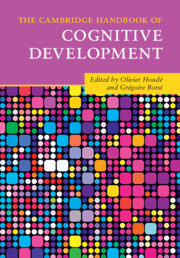Book contents
- The Cambridge Handbook of Cognitive Development
- The Cambridge Handbook of Cognitive Development
- Copyright page
- Contents
- Figures
- Tables
- Contributors
- Introduction
- Part I Neurobiological Constraints and Laws of Cognitive Development
- Part II Fundamentals of Cognitive Development from Infancy to Adolescence and Young Adulthood
- Part III Education and School-Learning Domains
- 25 Linking Cognitive Neuroscientific Research to Educational Practice in the Classroom
- 26 Literacy
- 27 Reasoning in Mathematical Development
- 28 Children’s Scientific Reasoning Skills in Light of General Cognitive Development
- 29 Working Memory Training
- 30 Interventions for Improving Executive Functions during Development
- 31 Curiosity-Driven Learning in Development
- 32 Neurocomputational Methods
- Index
- Plate Section (PDF Only)
- References
26 - Literacy
Understanding Normal and Impaired Reading Development through Personalized Large-Scale Neurocomputational Models
from Part III - Education and School-Learning Domains
Published online by Cambridge University Press: 24 February 2022
- The Cambridge Handbook of Cognitive Development
- The Cambridge Handbook of Cognitive Development
- Copyright page
- Contents
- Figures
- Tables
- Contributors
- Introduction
- Part I Neurobiological Constraints and Laws of Cognitive Development
- Part II Fundamentals of Cognitive Development from Infancy to Adolescence and Young Adulthood
- Part III Education and School-Learning Domains
- 25 Linking Cognitive Neuroscientific Research to Educational Practice in the Classroom
- 26 Literacy
- 27 Reasoning in Mathematical Development
- 28 Children’s Scientific Reasoning Skills in Light of General Cognitive Development
- 29 Working Memory Training
- 30 Interventions for Improving Executive Functions during Development
- 31 Curiosity-Driven Learning in Development
- 32 Neurocomputational Methods
- Index
- Plate Section (PDF Only)
- References
Summary
How do children learn to read? How do deficits in various components of the reading network affect learning outcomes? How does remediating one or several components change reading performance? In this chapter, we summarize what we know about learning-to-read and how previous computational models have tackled this issue. We then present our developmentally plausible computational model of reading acquisition and show how it helps to understand both normal and impaired reading development (dyslexia). In particular, we show that it is possible to simulate individual learning trajectories and intervention outcomes on the basis of three component skills: orthography, phonology and vocabulary. The work advocates a multi-factorial computational approach of understanding reading that has practical implications for dyslexia and intervention.
Information
- Type
- Chapter
- Information
- The Cambridge Handbook of Cognitive Development , pp. 554 - 565Publisher: Cambridge University PressPrint publication year: 2022
